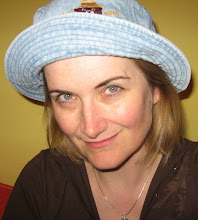When I lived in Northwest Washington DC in my 20s, it was still a fairly sleepy little town with used car dealers and strip clubs within a few blocks of the White House. Aside from a few friends who worked for the government, it seemed everyone else my age was foreign, either a recent immigrant from one of 100 different countries, or a foreign journalist, a World Bank minion, an Iranian refugee, or an embassy staffer. In fact so many people in my neighborhood were foreign that you were assumed foreign until proven otherwise. I was myself often mistaken by fellow Americans for a Swede, and complimented on my well-spoken English!
That foreignness, that international flavor, attracted another demographic like crazy -- foreign service brats. Now young adults who had been brought up around the world by parents in the diplomatic service or other international careers. I remember one boyfriend who kept exclaiming because all the city signs were in English and it was so "incredibly" convenient. He'd never lived anywhere the English language was public before. Like him, many of my friends had lived everywhere as children ... except America itself. Suddenly they found themselves at 21 or 22, ejected from school and family, starting a new life in a strange country.
Now, as a stepmother to two young adults who grew up in two different countries before immigrating to America, I again see that "Which country is mine? Where do I fit?" played out around me.
So, I was happy to find Linda Bell's book, 'Hidden Immigrants' because she helped explain that no-man's-land of adjustment when you've spent much of your life in one country and then move back to your "native" land. Much of the material is direct transcription highlights of oral histories given by 13 real-life 'hidden immigrants' about their adjustment to life back in the home country.
Most fascinating are the conclusions about life patterns that Bell draws from her research. It seems people who grew up outside of their home country, especially those who moved several times, often exhibit very similar patterns, pains and problems. And yet, the stories they told of their childhood, the worlds they lived in... you can't help but be a little jealous.
Reviews of my favorite books written by expatriates, journalists, and diplomats on what it's really like to live abroad
Subscribe to:
Post Comments (Atom)

No comments:
Post a Comment